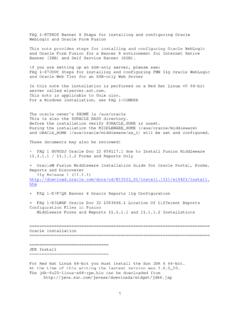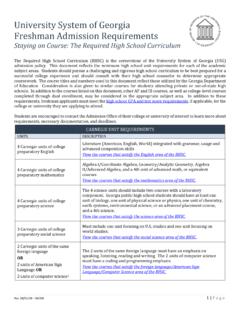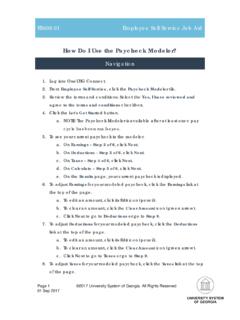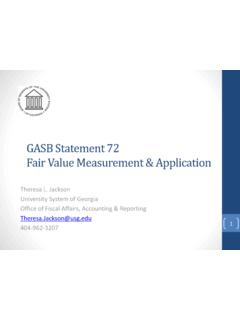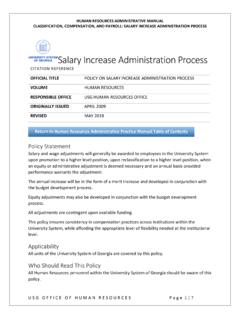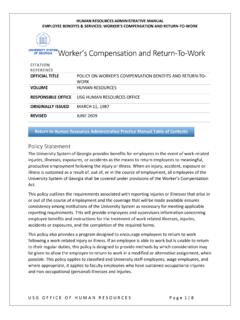Transcription of MASTER PLAN GUIDELINES - University System of Georgia
1 Board of Regents of the University System of Georgia Real Estate and Facilities MASTER PLAN GUIDELINES . OCTOBER 2018. This document updates scope, process, and approach expectations for MASTER planning projects with University System of Georgia (USG) institutions. Its potential users include consultants pursuing planning projects with USG, and institutions' facilities personnel or others who maintain datasets utilized in MASTER planning. CONTENTS. INTRODUCTION 1. MASTER PLAN WORK PROGRAM 3. ADDITIONAL PHYSICAL PLANNING STUDIES 8. INTRODUCTION. MASTER PLANNING AND THE MASTER PLAN PROCUREMENT. FRAMEWORK APPROACH REF recommends that institutions engage external consultants for MASTER planning.
2 MASTER plans usually require broad input and buy- Since 1997, University System of Georgia (USG) institutions have in in order to be successful, and consultants, in addition to providing undertaken campus MASTER planning in accordance with the USG. design insights and expertise, can serve as a neutral party to facilitate MASTER Planning Template (1997 Template). The 1997 Template honest dialogue and mediate issues that might be challenging for was a comprehensive document essentially designed to create a new internal constituents. MASTER plan from the ground up, with a scope including exhaustive technical documentation and dataset creation.
3 USG and its need for Institutions shall engage REF's Director of Planning at the beginning effective physical and capital planning have evolved profoundly since of the procurement process to solidify scope, fee, data availability, and 1997. Accordingly, these new MASTER planning GUIDELINES intend to timeline. REF shall be consulted even in cases where fees are within move USG toward a model that: the institution's delegated authority. relies on institutionally maintained data, broad stakeholder engagement, and consultant insight;. analyzes and integrates System frameworks to improve campus DATA INPUTS FOR MASTER . functionality and sustainability; and PLANNING.
4 Provides strong capital-prioritization structures while The 1997 Template assumed that consultants would verify and maintaining long-term, project-specific flexibility. update datasets with each planning engagement; since then, data The resulting plans should establish a long-term framework- and maintenance responsibilities have shifted to individual institutions. principle-based vision that: Accurate data provides an essential MASTER plan foundation and, for campuses that struggle with data accuracy and maintenance, guides future decision making;. we outline essential datasets below. The items described below provides clear and financially feasible near-term priorities; are not an exhaustive list: institutions should provide consultants establishes concrete criteria for future planning decisions; and with additional data that they trust, and consultants should request additional datasets they find useful.
5 It is the consultants'. promotes stewardship of campus assets, especially responsibility to incorporate relevant, available data into analysis historic resources. and scenario development, even if its use exceeds the basic scope outlined in these GUIDELINES . Physical planning must integrate both financial and academic considerations: academic integration grounds the strategic plan's aspirations within physical realities of the campus, while financial DATA FROM REF. integration helps institutions set realistic capital investment goals. Institutional MASTER planning shall incorporate System -wide assumptions and methodologies so that resulting priorities can be WHEN IS THE RIGHT TIME TO easily justified and understood.
6 To ensure consistency, REF staff will UNDERTAKE A MASTER PLAN? provide the following information: USG Real Estate and Facilities (REF) generally recommends that institutions formally update their MASTER plans in approximately Enrollment projections 10-year intervals. A MASTER plan process can help resolve lack of Institutions and consultants shall work with REF staff to develop a clarity around major campus systems, such as transportation or range of enrollment trajectories, based on System -wide projections, academic program distribution, which makes it difficult to move that ensure the creation of a sound plan. forward on necessary projects or justify specific capital priorities within an institution-wide context.
7 A MASTER plan process can also help institutions test physical implications of major new initiatives Space Data or shifting circumstances, especially those connected to changes in The space utilization methodologies and metrics that USG began leadership or mission, strategic plan updates, campus acquisition, developing in 2011 provide the foundation for space-needs or institutional consolidation. 2018 University System of Georgia MASTER Plan GUIDELINES Introduction | 1. assessment in MASTER planning. These focus on opportunities field in the room inventory, meeting room schedule records, for improved utilization and efficiency versus more traditional occupancy tracking for open labs or study spaces, leased-space normative space needs projections.
8 Institutions submit data to USG information, etc. on a semi-annual basis, which facilitates System -wide analysis. REF. staff will provide high-level analysis for consultants to incorporate Consultants should request any additional files they find useful in into MASTER planning efforts. REF staff will also provide the following analysis and should be prepared to describe their analysis approaches files from institutional submissions: and methods for gathering additional data (through surveys, etc.). during the procurement process. Examples of additional data include: Building inventory Sponsored research expenditures, by primary investigator (PI), Room inventory departments, and year Course schedule PI research lab locations Employee headcount and FTE.
9 Core facility locations Student headcount and FTE. Course enrollment information by student (for academic adjacency analysis). If institutions question the validity of these datasets, they should consult with REF staff to determine appropriate strategies prior to Traffic counts engaging MASTER planning consultants. Geocoded accident data It is the consultant's responsibility to work within USG's Geocoded crime data methodological framework when performing additional in-depth Hazard vulnerability analysis for natural disasters analysis, especially when justifying priority projects or net increases Bicycle infrastructure (designated lanes, parking rack in square footage.)
10 Locations, etc.). Shuttle routes and schedules DATA FROM INSTITUTIONS. Campus accessibility issues During the procurement process, REF staff will work with Residential beds and occupancy rates per building, including institutions to determine the availability and accuracy of the unit typology, and occupant student year following highly recommended datasets, as this may influence the MASTER plan scope and fee. In certain cases, targeted data collection Anonymized student and employee address data within or prior to the MASTER plan may be appropriate. Utility and communications infrastructure condition and Campus base map file in CAD (.
